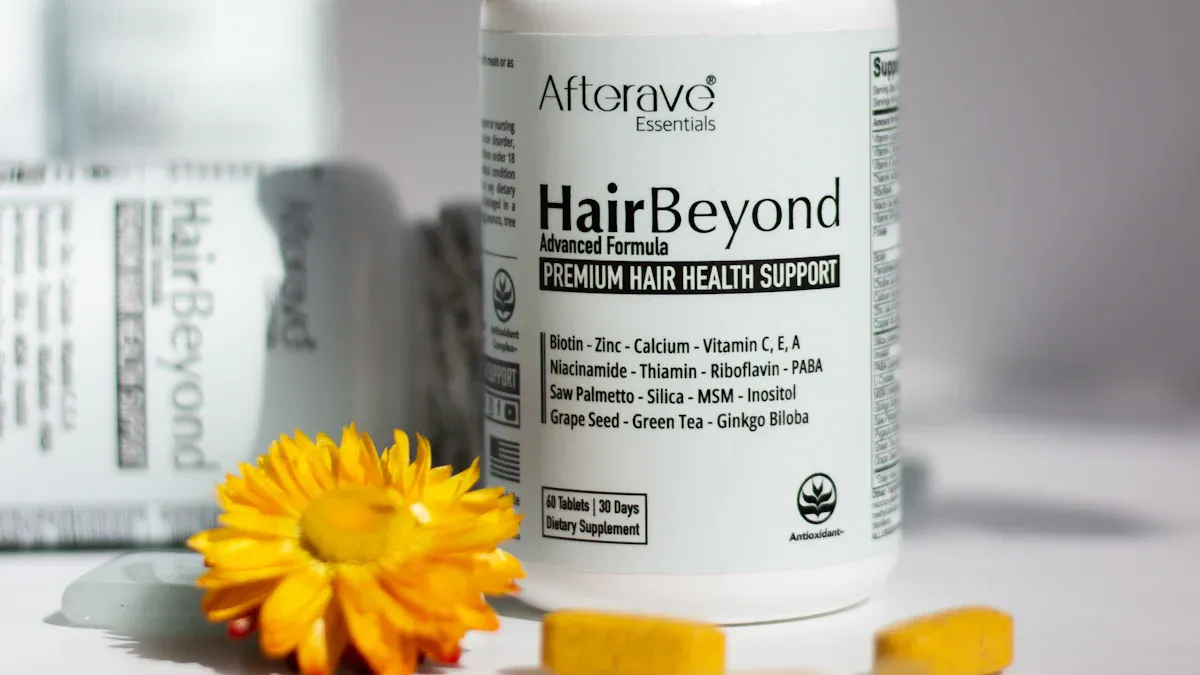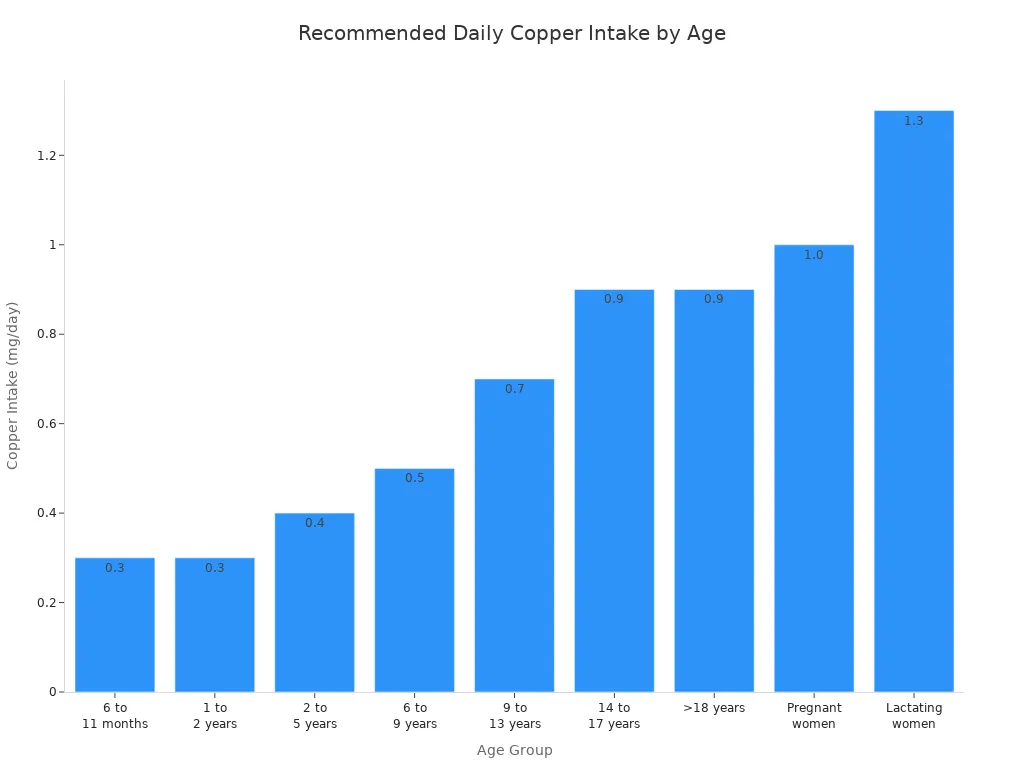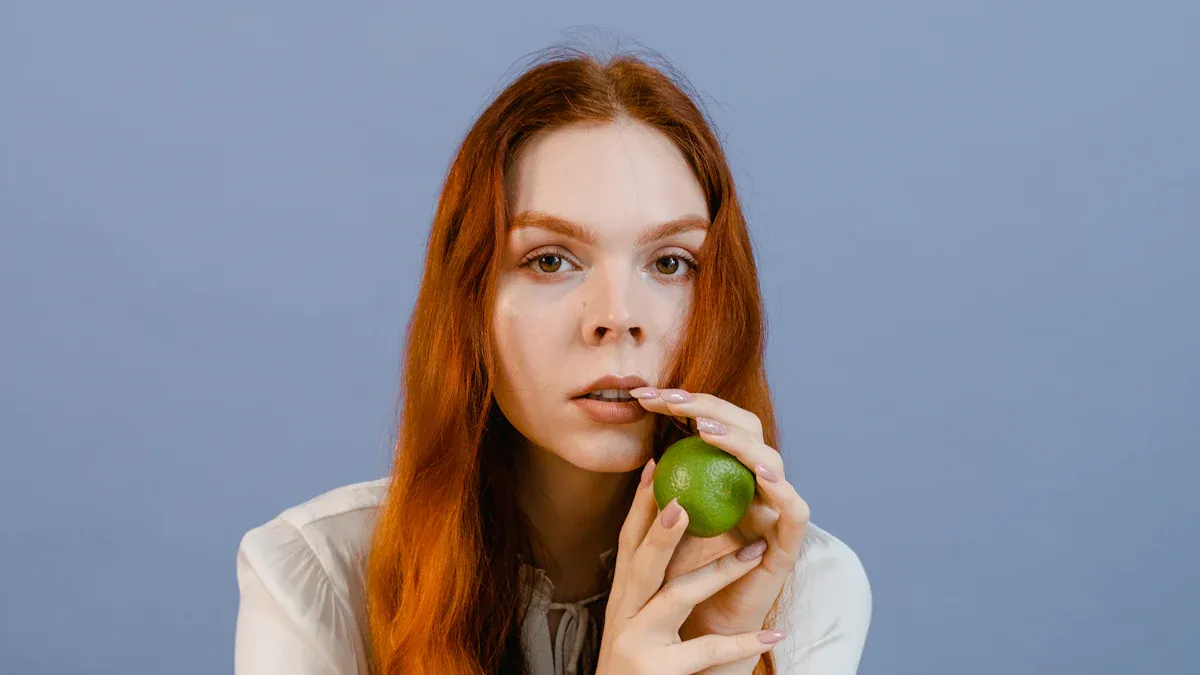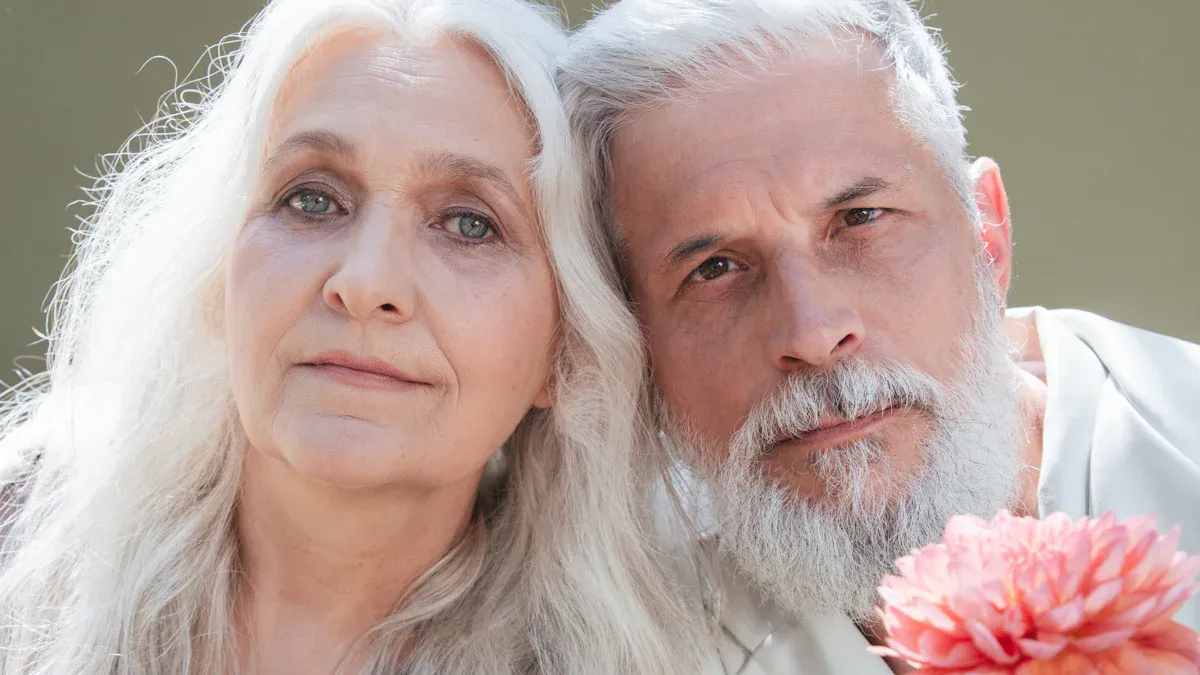
You spot a gray hair in the mirror and wonder if nutrition’s role could change things. Many people ask if eating better can reverse gray hair. Research shows nutrition’s role matters. Studies link low iron, copper, and calcium to early gray hair. Nutrition’s role connects directly to hair pigmentation. You might notice more gray strands when nutrition’s role gets ignored. Nutrition’s role goes beyond food choices. Stress and habits also play a part. You cannot expect a miracle, but nutrition’s role may help slow things down.
Key Takeaways
A balanced diet rich in vitamins and minerals can help slow down premature gray hair. Focus on foods high in vitamin B12, iron, copper, and vitamin D.
Antioxidants play a crucial role in protecting hair follicles from damage. Include fruits and vegetables like berries and leafy greens in your meals to boost antioxidant intake.
Stress management is essential for hair health. Engage in relaxing activities like walking or listening to music to reduce stress and support your hair’s natural color.
Avoid smoking and limit alcohol consumption. Both can increase oxidative stress and lead to premature graying, so prioritize healthy habits for vibrant hair.
Consult a healthcare professional before starting any supplements. A balanced diet is safer and more effective for maintaining hair health than relying solely on pills.
Nutrition’s Role in Gray Hair
Science Behind Hair Pigmentation
You might wonder why your hair changes color as you age or why some people see gray strands earlier than others. The answer starts with how your body makes hair color. Your hair gets its color from melanin, a pigment produced by special cells called melanocytes. These cells work together with other skin cells to create the shade you see in the mirror.
Hormones like α-MSH, ACTH, and estrogens help stimulate melanin production in your hair.
Your genes control over 150 alleles at more than 90 spots in your DNA, which affects how much melanin your hair makes.
The teamwork between follicular melanocytes, keratinocytes, and dermal papilla fibroblasts is key for keeping your hair colored.
Melanogenesis, the process that creates melanin, depends on signals from skin cells. This process happens mostly during the anagen phase, which is when your hair grows. The MC1R gene on melanocytes is important for normal pigmentation. It decides how much eumelanin and pheomelanin your hair gets, which changes your hair color. If your body makes less melanin, your hair looks lighter or turns gray.
During hair growth, melanocyte stem cells create new cells that move to the hair bulb. These cells then help color the hair shaft. If these stem cells get damaged or tired, you may notice premature graying. DNA damage can speed up this process, making gray hair appear sooner.
Tip: Eating foods that support healthy skin and hair cells may help keep your melanin production working well. This can delay premature graying and help you keep your natural hair color longer.
Genetics and Environment
You might blame stress or diet for your gray hair, but your genes play a huge role. Research shows that the IRF4 gene controls about 30% of hair greying. If your parents or grandparents had premature graying, you have a higher chance of seeing gray hair early too. Your family history is a strong clue about when you might start to notice gray strands.
Genetic predisposition decides when and how quickly your hair loses color. The IRF4 gene helps regulate melanin production. When your body stops making enough melanin, your hair turns gray. This is why some people see premature graying even if they eat well and take care of their hair.
But your environment matters too. Things like UV radiation, pollution, and smoking can speed up premature graying. Here’s how:
UV rays and pollution cause oxidative damage to your hair and skin cells.
Ionizing radiation can hurt melanocytes, leading to permanent DNA damage and gray hair.
Smoking lowers blood flow to your hair follicles and increases stress, which can cause more gray strands.
Prolonged sun exposure breaks down important amino acids in your hair, like cystine, tryptophan, and tyrosine. This makes your hair rough and causes color loss. Air pollutants can age your hair faster and damage the cuticle, making gray hair show up sooner. Damaged cuticles also let color fade away quickly, so you see more gray.
Note: You can’t change your genes, but you can protect your hair from environmental damage. Wearing hats, using gentle hair products, and avoiding smoking may help slow down premature graying.
Premature Grey Hair Causes
Nutritional Deficiencies
You might wonder why you see premature grey hair even when you feel healthy. Many times, the answer hides in your diet. When your body misses out on key nutrients, your hair can lose its color faster than you expect. Research shows that vitamin B12 deficiency is a common cause of premature grey hair. If you do not get enough vitamin B12, your body cannot make enough melanin, which gives your hair its color.
Other nutrients matter too. Low levels of vitamin D, copper, and iron are often found in people with premature greying. These nutrients help keep your hair strong and colorful. If you skip meals or eat lots of junk food, you might not get enough of these vitamins and minerals. Over time, this can lead to more premature grey hair.
Here’s a quick look at how these nutrients connect to premature greying:
Nutrient | Role in Hair Color |
|---|---|
Vitamin B-12 | Helps make melanin for hair color |
Vitamin D | Supports healthy hair growth |
Copper | Needed for energy and hair pigment |
Iron | Keeps hair follicles healthy |
Tip: Eating a balanced diet with plenty of fruits, vegetables, lean meats, and whole grains can help you avoid premature grey hair caused by nutritional gaps.
Protein and Hair Health
You may not realize it, but your hair is made mostly of protein. Keratin, the main protein in hair, keeps each strand strong and healthy. If you do not eat enough protein, your hair can become weak, thin, and more likely to fall out. Severe protein deficiency can even cause your hair to lose its shine and color, which may lead to premature grey hair.
Hair needs protein for growth and repair.
Without enough protein, your hair follicles cannot work well.
Animal proteins give you all the amino acids your hair needs, but you can also get protein from beans, nuts, and seeds.
While there is no direct proof that low protein diets always cause premature greying, experts agree that poor protein intake can hurt your hair’s health. Over time, this may make premature grey hair more likely. So, if you want to keep your hair looking its best, make sure you get enough protein every day.
Note: You do not need to eat huge amounts of protein. Just make sure you include some in every meal to support healthy hair and help prevent premature grey hair.
Preventing Premature Grey Hair
Key Nutrients
You might wonder how you can help your hair stay colorful and strong. The answer often starts with the nutrients you get from your diet. Your hair needs a steady supply of essential nutrients to keep its natural color and shine. If you want to focus on preventing premature grey hair, you should pay attention to what you eat every day.
Many clinical studies show that certain nutrients play a big role in hair health. Here are some of the most important ones:
Copper helps your body make melanin, the pigment that gives hair its color. If you do not get enough copper, you may notice more grey strands.
Iron supports hemoglobin production, which carries oxygen to your hair follicles. Low iron levels can lead to dull and grey hair.
Vitamin B-12 is vital for hair pigmentation. Young adults who do not eat enough animal products often lack vitamin B-12, which can cause premature greying.
Vitamin D helps your body produce melanin. People with low vitamin D often see grey hair earlier.
Pantothenic acid (vitamin B5) supports energy metabolism and hair growth. Animal studies show that a lack of pantothenic acid can cause grey fur, but human evidence is still limited.
Biotin helps strengthen hair and supports overall hair health.
You can see how much copper you need each day in the table below:
Age | Recommended Copper Intake (mg/day) |
|---|---|
6 to 11 months | 0.3 |
1 to 2 years | 0.3 |
2 to 5 years | 0.4 |
6 to 9 years | 0.5 |
9 to 13 years | 0.7 |
14 to 17 years | 0.9 |
>18 years | 0.9 |
Pregnant women | 1.0 |
Lactating women | 1.3 |

You need a balanced diet to get these nutrients. Eating foods like eggs, leafy greens, berries, and nuts can help you meet your daily needs. These foods contain vitamins, minerals, and other essential nutrients that promote hair health. If you skip meals or eat lots of processed foods, you may miss out on these important nutrients.
Tip: Try to include a variety of foods in your diet. This helps you get enough copper and vitamin B12, iron, vitamin D, biotin, and other nutrients that support overall hair health and prevention of premature greying.
Antioxidants
You might hear a lot about antioxidants, but do you know how they help your hair? Antioxidants protect your hair follicles from damage caused by free radicals. Free radicals are unstable molecules that attack your cells and speed up aging, including greying of hair.
Antioxidants work like a shield. They neutralize these harmful molecules and keep your hair follicles healthy. This helps preserve melanocyte stem cells, which are needed for hair pigmentation. If you want to promote hair health and delay grey hair, you should eat a diet rich in antioxidants.
Here’s how antioxidants help your hair:
They prevent oxidative stress, which is linked to hair graying.
Antioxidants reduce cell death and stress, keeping your hair follicles strong.
Citrus Reticulata, a type of mandarin orange, can stimulate melanin production and fight oxidative stress.
You can find antioxidants in many foods. Here are some top choices for a diet rich in antioxidants:
Eggs – Packed with protein and essential nutrients for hair strength.
Leafy greens – Provide vitamins A and C for scalp health.
Berries – High in vitamin C, which protects hair follicles.
Check out this table for more foods that support hair health:
Food Item | Antioxidant Type | Benefits for Hair Health |
|---|---|---|
Citrus Fruits | Vitamin C | Protects hair from oxidative damage |
Bell Peppers | Vitamin C | Supports scalp health and fights inflammation |
Cruciferous Veggies | Vitamin C | Protects hair follicles and promotes overall hair health |
Spinach | Vitamins A & C | Produces sebum for scalp moisture and provides iron |
Kale | Vitamins A & C | Promotes healthy scalp and stimulates hair growth |
Berries | Vitamin C | Protects hair follicles and helps collagen production |
Sweet Potatoes | Beta-Carotene | Converts to vitamin A, promoting a healthy scalp |
Eggs | Protein | Provides essential nutrients for hair strength |
Salmon | Omega-3 Fatty Acids | Supports scalp health and reduces hair loss |
Nuts | Vitamin E | Protects hair from oxidative stress |
You can boost your antioxidant intake by eating more fruits and vegetables. Spinach and kale are great sources of vitamins A and C, which help your scalp produce sebum and keep your hair moisturized. Berries like strawberries and blueberries are loaded with vitamin C, which protects your hair follicles and helps your hair grow strong.
Note: A diet rich in antioxidants does not just help your hair. It also supports your overall health and can slow down the signs of aging.
If you want to focus on preventing premature grey hair, remember that a balanced diet with plenty of vitamins, minerals, and antioxidants is key. You cannot control your genes, but you can make smart choices every day to promote hair health and prevention.
Diet and Supplements for Grey Hair Prevention

Foods to Include
You might wonder what foods can help with grey hair prevention. Choosing the right diet makes a big difference. A nutrient-rich diet gives your hair the vitamins and minerals it needs to stay healthy and colorful. Here are some foods you should add to your meals:
Berries: These are packed with antioxidants. They help fight oxidative stress, which can cause early graying. Dr. Anna Chacon says berries make your hair stronger and softer.
Leafy greens: Spinach and kale have vitamins A, C, and E. They also contain iron and calcium. These nutrients support your hair follicles and help your body make melanin.
Nuts and seeds: Almonds, walnuts, and sunflower seeds are high in biotin and zinc. Dr. Rebecca Hilton notes that zinc is vital for healthy skin and hair.
Liver: This food is rich in vitamin B12, copper, iron, and vitamin B9. These nutrients help keep your hair color and health.
Lentils: Lentils give you vitamin B9, which is important for hair pigmentation.
Salmon: Salmon provides selenium and vitamin D. These help regulate hormones and keep your natural hair color.
Miso and seaweed: These foods have living enzymes, zinc, and vitamins A and C. They may boost your hair health.
You can also eat fresh fruits, green tea, olive oil, and fish. These foods are high in antioxidants and support grey hair prevention.
Supplement Safety
You may think about using supplements for grey hair, but safety matters. Diet and supplements can work together, but you should be careful. Supplements for grey hair are not regulated by the FDA. You need to talk to your doctor before starting any new supplement. Too much vitamin A or selenium can cause hair loss. Always follow your doctor’s advice on dosage and brand.
Here is a quick look at recommended daily allowances:
Nutrient | RDA (Women) | RDA (Men) |
|---|---|---|
Vitamin A | 700 mcg | 900 mcg |
Zinc | 8 mg | 11 mg |
Getting enough vitamins and minerals from your diet is safer than relying on pills. Nutrient deficiencies can lead to hair loss. A balanced diet and supplements, when needed, help you maintain healthy hair.
Tip: Always check with a healthcare professional before adding supplements to your routine. This helps you avoid risks and keeps your hair safe.
Lifestyle Factors
Stress
You might notice more gray hairs during stressful times. Stress does more than make you feel tired or anxious. It can actually change your hair color. When you feel stressed, your body releases hormones like cortisol. These hormones disrupt the cells that make melanin, the pigment that colors your hair. Stress also activates nerves that trigger the fight-or-flight response. This can damage pigment-regenerating stem cells in your hair follicles.
Here’s what happens inside your body when stress hits:
Mechanism | Description |
|---|---|
Norepinephrine | Causes death of melanocyte stem cells, leading to hair greying |
Sympathetic Nervous System | Releases norepinephrine under stress, affecting pigment-producing cells |
Stress Types | Both psychological and physical stress can cause hair greying |
Melanocyte Stem Cells | Loss of these cells means your hair cannot make pigment anymore |
Stress can also cause inflammation. This damages melanocytes and their stem cells, which leads to premature graying. Once these stem cells are gone, your hair cannot regain its color. Some people wonder if reducing stress will bring back their natural hair color. While graying can sometimes reverse, lowering stress does not always restore pigment. Your hair needs to reach a certain biological age before stress causes it to turn gray.
Tip: Try relaxing activities like walking, listening to music, or spending time with friends. These can help lower stress and support healthy hair.
Smoking and Alcohol
You may not realize how much smoking and alcohol affect your hair. Smoking increases oxidative stress in your body. This damages the cells that make melanin, causing your hair to lose its color faster. Studies show smokers are two and a half times more likely to develop premature gray hair than non-smokers. In one study, 40.2% of smokers had early graying, compared to only 24.7% of non-smokers.
Study | Findings |
|---|---|
Zayed et al. | Smokers had an earlier onset of hair graying compared to non-smokers |
Observational Study | Smokers began to gray earlier than non-smokers |
General Findings | Increased oxidative stress from smoking damages melanocytes |
Alcohol can also hurt your hair. Drinking too much leads to dehydration, which makes your scalp and hair dry. Dry hair breaks easily and looks dull. Heavy drinking can cause nutritional deficiencies and hormonal imbalances. These problems may lead to hair loss or thinning. Stress from alcohol may speed up the graying process, but genes play the biggest role in hair color.
Alcohol can cause dehydration, making hair dry and brittle.
Heavy drinking may lead to vitamin and mineral shortages, hurting hair health.
Hormonal changes from alcohol can cause hair loss.
Staying hydrated and eating well helps protect your hair.
Note: If you want to keep your hair healthy, avoid smoking and drink alcohol in moderation. Focus on good nutrition and self-care for the best results.
When to Seek Professional Advice

You might notice a few gray hairs and wonder if you should worry. Most of the time, gray hair is just a normal part of aging. Sometimes, though, it can signal something more. You should pay attention to your body and look for signs that mean you need help from a doctor.
Here are some reasons to reach out for professional advice:
You see gray hair at a very young age, especially if your family has a history of early graying.
You feel tired or weak and notice your hair changing color quickly. This could mean you have a nutritional deficiency, like low vitamin B12, B3, iron, or copper.
You have other symptoms, such as skin changes, patches of hair loss, or changes in your nails.
You live with a medical condition, such as vitiligo, neurofibromatosis, or hypothyroidism.
You deal with chronic stress or smoke often, which can affect your hair and overall health.
You take medications that list hair changes as a side effect.
Tip: If you notice sudden or rapid graying, don’t ignore it. Your body might be trying to tell you something important.
Some medical conditions can cause your hair to turn gray quickly. Here’s a table that shows a few of them:
Medical Condition | Description |
|---|---|
Autoimmune Disorders | These can affect hair pigmentation, like vitiligo or pernicious anemia. |
Nutritional Deficiencies | Missing key nutrients, such as vitamin B12, can lead to graying. |
Genetic Conditions | Disorders like neurofibromatosis or tuberous sclerosis may cause early gray. |
Thyroid Disease | Problems with your thyroid can change your hair color. |
Alopecia Areata | This causes patchy hair loss, making gray hairs stand out. |
You don’t have to figure this out alone. If you feel unsure, talk to a healthcare provider. They can check for health problems and help you find answers. Sometimes, a simple blood test or exam can show what’s going on. You deserve to feel confident about your hair and your health.
You can help your hair stay healthy and vibrant by eating a balanced diet and making smart lifestyle choices. Focus on foods rich in copper, vitamins A, C, E, and B-complex, like eggs, nuts, leafy greens, and berries. Staying hydrated and managing stress also support strong hair.
Nutrient | Role in Hair Health |
|---|---|
Vitamin B12 | Supports hair growth and color |
Iron | Helps make melanin for hair pigmentation |
Copper | Needed for natural hair color |
Calcium | Linked to healthy hair |
Vitamin D3 | Supports hair and scalp health |
Before making big changes to your diet or taking supplements, talk to a healthcare professional. Some supplements can cause harm if not used safely. Remember, gray hair is natural. Embrace your unique look and make choices that help you feel your best!
FAQ
Can you reverse gray hair by changing your diet?
You cannot reverse gray hair just by eating better. A healthy diet may slow down new gray hairs. Once your hair turns gray, it usually stays that way.
What vitamins help prevent gray hair?
You need vitamin B12, vitamin D, copper, and iron for healthy hair color. These nutrients help your body make melanin. Try to eat foods like eggs, leafy greens, and nuts.
Does stress really cause gray hair?
Yes, stress can speed up gray hair. Your body releases hormones that affect hair pigment cells. Relaxing activities like walking or listening to music may help lower stress.
Are supplements safe for gray hair prevention?
Supplements can help if you have a deficiency. You should talk to your doctor before taking any. Too much of some vitamins or minerals can harm your hair and health.
Is gray hair always a sign of aging?
Not always. You might see gray hair early because of genes, stress, or missing nutrients. If you notice sudden changes, check with your doctor to rule out health problems.
